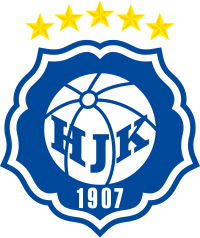Helsingin Jalkapalloklubi
 |
|
| Full name | Helsingin Jalkapalloklubi |
|---|---|
| Nickname(s) | Klubi (The Club) |
| Founded | 19 June 1907 |
| Ground |
Sonera Stadium, Helsinki |
| Capacity | 10,770 |
| Chairman | Olli-Pekka Lyytikäinen |
| Manager | Mika Lehkosuo |
| League | Veikkausliiga |
| 2016 | Veikkausliiga, 2nd |
Helsingin Jalkapalloklubi (literally "The Football Club of Helsinki", simply known as HJK and HJK Helsinki) is a professional football club based in Helsinki, Finland. Founded in 1907, the club has spent most of its history in the top tier of Finnish football. The club's home ground is the 10,770-seat Sonera Stadium, where they have played since 2000.
Generally considered Finland's biggest club, HJK is the most successful Finnish club in terms of championship titles with 27. The club has also won twelve Finnish Cups and five Finnish League Cups. Many of Finland's most successful players have played for HJK before moving abroad.
HJK is the only Finnish club that has participated in the UEFA Champions League group stage. In 1998 they beat FC Metz in the playoff round to clinch their place in the competition for the following season. HJK has also participated in the UEFA Europa League in 2014, beating SK Rapid Wien in the playoff round. The club's highest score in a European competition came during the 2011–12 season, with a 13–0 aggregate victory over Welsh champions Bangor City, which included a 10–0 win at home.
HJK's regular kit colors have long been blue and white shirts with blue shorts and socks. The club's crest has been nearly untouched for a century, it has only undergone one minor font change in order to modernize it.
The Club was founded as "Helsingin Jalkapalloklubi – Helsingfors Fotbollsklubb" in 1907 by Fredrik Wathén. The founding meeting was held at a bowling alley in Kaisaniemi Park in May. First match was played against Ekenäs IF in Ekenäs, HJK won the match 2–4. From early on, HJK became popular amongst Finnish speaking students while Swedish speaking students preferred to play mainly for Unitas or HIFK. In late 1908 after a heated debate, the language was switched to unilingually Finnish and this resulted in many Swedish speaking members switching over to HIFK and other clubs although a few chose to stay.
...
Wikipedia
